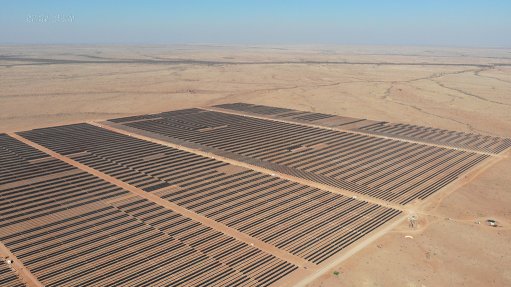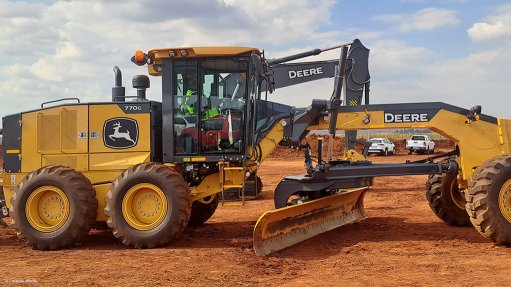Building sustainable economies through good governance of extractives industry
A pertinent question remains unanswered: Can mining economies lead to sustainable economies? This is an appropriate question in the context of the yearly parade in Cape Town. I am referring to the Mining Indaba, which attracts about 6 000 people from all over the world. For Africa, turning its latent mineral wealth and other natural resources, including wildlife, into real wealth remains a Sisyphean task. The potential of the continent to turn latent wealth into other forms of wealth could make it one of the richest continents in the world.
The question of how to produce sustainable economies out of depleting and unsustainable mining economies is a story not of whether mining is interlinked with beneficiation or that we generate sufficient royalties from exporting raw minerals; more importantly, it is about the primacy of governance and institutional robustness to ensure long-run growth and wellbeing and, with this, the broader diversification of the economy out of minerals dependence.
Poor governance and institutional weakness increase minerals dependence, which, coupled with poor governance, brings about increasing levels of indebtedness. Consider this striking paradox: from the 1980s to this day, illicit outflows of revenue from Africa have been estimated at about $900-billion, while the continent's overall debt stands at about $200-billion.
The one does not give cover to the other, as spiralling debt – which has been fairly managed so far – can only be paid for through more extractives: minerals, cash crops and other natural products. The hole becomes bigger, not smaller.
Improved governance reduces rent-seeking and increases the tax base from which governments can draw down to do more things and begin the process of focusing on Africa's most important resource – its people.
There is no need to blurt out the old trope: people matter, and it is growth in knowledge and the skills base and improving tacit knowledge through experience that African countries become more and more sustainable in the future. Governance is a strategic institutional resource for governments to achieve long-term ends. Easy rents from a commodities boom tend to favour political entrepreneurship rather than commercial entrepreneurship and advance new innovations.
While we try to resolve the issue of better governance for the people, minerals leave our shores unabated without much value-add. Mining for the people remains empty rhetoric.
At the Kazungula border post, between Botswana and Zambia, trucks carrying copper and other goods line up as they wait for a ferry to take them across the river from Zambia into Botswana or vice versa. Mostly, copper leaves the Democratic Republic of Congo or the Zambian Copperbelt to Walvis Bay, in Namibia, or Richards Bay, in South Africa. The convoys stretch for miles. The truckers have become used to this. They sit it out. They drive for miles back and forth. Along the main transit points, hawkers engage in enterprising activities, such as selling food, offering bed-and-breakfast services for the night or selling beer. These is even a little makeshift discotheque for the truckers overlaying for the night. As long as the trucks keep going through the border post, a small local economy is sustained.
Across the Kazungula river, a new bridge is being financed by the Japanese International Cooperation Agency and the African Development Bank. The entire project is impressive and meant to cut the time trucks spend at the Kazungula border post before crossing from Zambia into Botswana or vice versa.
By 2020, the ferry business will have died and trucks will cross seamlessly as a new digitalised border crossing system is introduced. While the new Kazungula bridge will bring about efficiencies, one cannot escape the fact that a great deal of infrastructure build is one-sided in that it is only financed through international sources.
The convoys of copper trucks and their armed escorts are more than symbolic. They do not tell a story of wealth but rather the absence of it. The trucks offload copper onto ships heading for China, South Korea or Japan, where it is manufactured into higher-value goods. Some copper may be used in Africa but we end up buying back our own copper in finished goods – mostly high-value electronic goods, cables or other products.
Even where beneficiation takes place, it either favours the interests of the investor or is simply at odds with the needs of a country. In the latter case, the interests of Shenzhen Energy Group in building a coal-fired plant in Ghana is quite odd, even although Ghana needs the power. The West African country has no coal; it will have to import it from South Africa, and this will significantly impact on its current account.
Ghana has better options: cost-effective renewables or expanding thermal energy production from the West African gas pipeline, enabling it to build a more robust energy system by creating a hybrid gas-and-renewables generation system in the future.
The hard work of building sustainable economies will not result from the goodwill of foreign money or power. Economics and geopolitics are not the playbook of idealism, but of realism. Africa has substantive foreign interests and how we shape our future with growing foreign interest and presence is entirely dependent on taking fate into our own hands.
The ability of African citizens to hold their politicians and elites to account will shape the future of Africa. Perhaps this fate lay into two things for tomorrow: a bulging youth and a growing concentration of people wanting to live in cities. Youthfulness and demand for reform in a concentrated urban space has the potential to shape a new politics. Only good governance over our own affairs can lead to sustainable economies, not digging more holes.
Comments
Press Office
Announcements
What's On
Subscribe to improve your user experience...
Option 1 (equivalent of R125 a month):
Receive a weekly copy of Creamer Media's Engineering News & Mining Weekly magazine
(print copy for those in South Africa and e-magazine for those outside of South Africa)
Receive daily email newsletters
Access to full search results
Access archive of magazine back copies
Access to Projects in Progress
Access to ONE Research Report of your choice in PDF format
Option 2 (equivalent of R375 a month):
All benefits from Option 1
PLUS
Access to Creamer Media's Research Channel Africa for ALL Research Reports, in PDF format, on various industrial and mining sectors
including Electricity; Water; Energy Transition; Hydrogen; Roads, Rail and Ports; Coal; Gold; Platinum; Battery Metals; etc.
Already a subscriber?
Forgotten your password?
Receive weekly copy of Creamer Media's Engineering News & Mining Weekly magazine (print copy for those in South Africa and e-magazine for those outside of South Africa)
➕
Recieve daily email newsletters
➕
Access to full search results
➕
Access archive of magazine back copies
➕
Access to Projects in Progress
➕
Access to ONE Research Report of your choice in PDF format
RESEARCH CHANNEL AFRICA
R4500 (equivalent of R375 a month)
SUBSCRIBEAll benefits from Option 1
➕
Access to Creamer Media's Research Channel Africa for ALL Research Reports on various industrial and mining sectors, in PDF format, including on:
Electricity
➕
Water
➕
Energy Transition
➕
Hydrogen
➕
Roads, Rail and Ports
➕
Coal
➕
Gold
➕
Platinum
➕
Battery Metals
➕
etc.
Receive all benefits from Option 1 or Option 2 delivered to numerous people at your company
➕
Multiple User names and Passwords for simultaneous log-ins
➕
Intranet integration access to all in your organisation


















